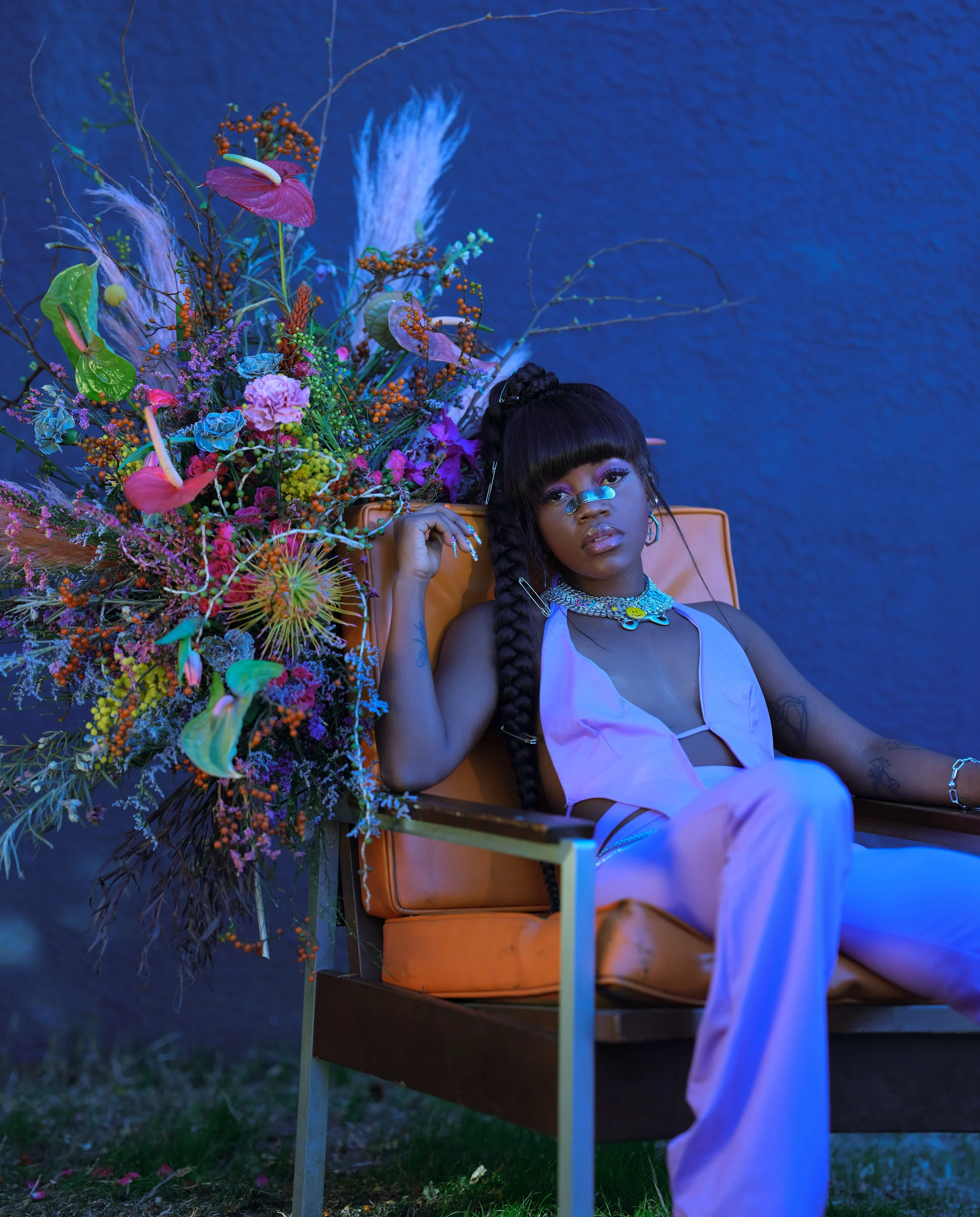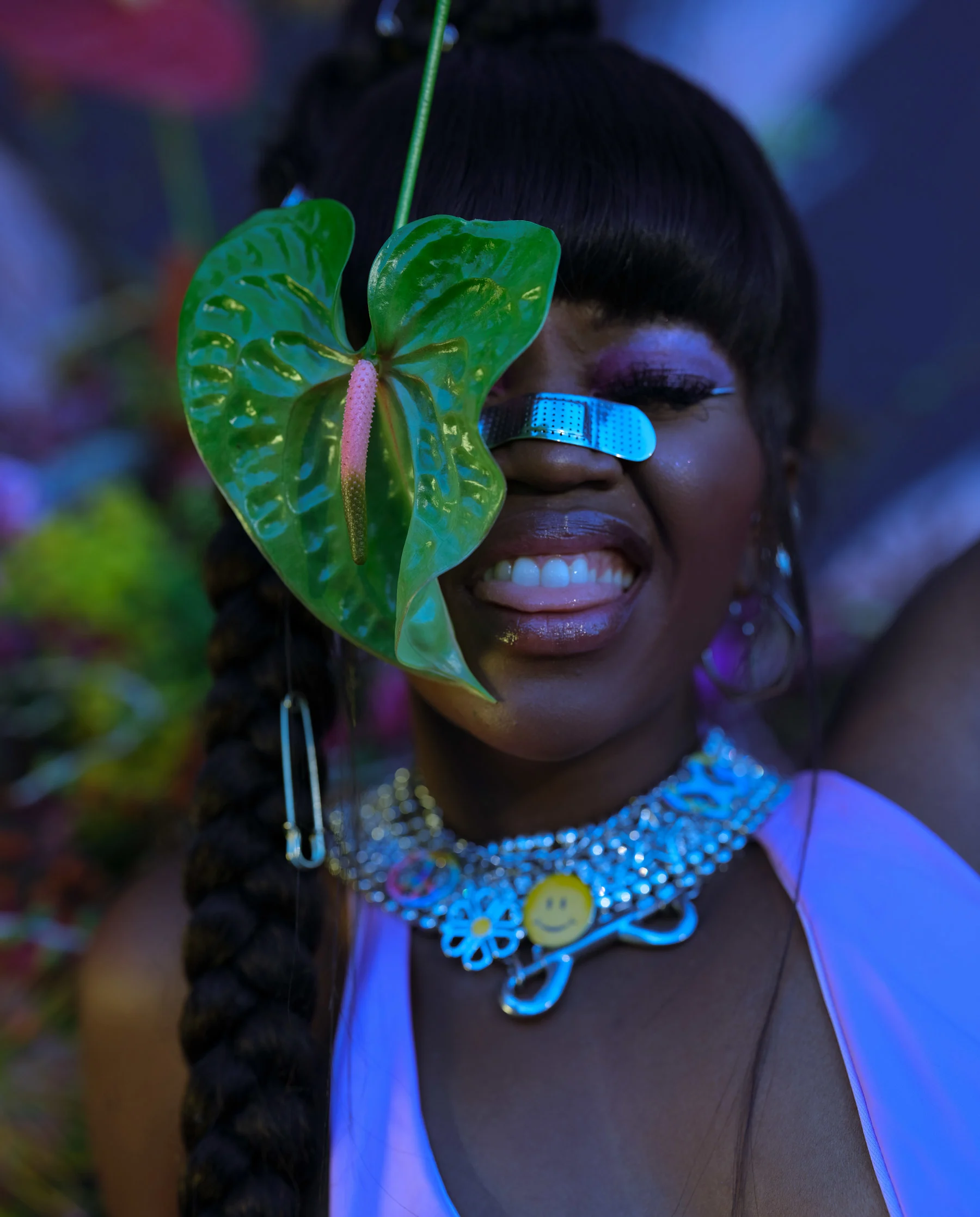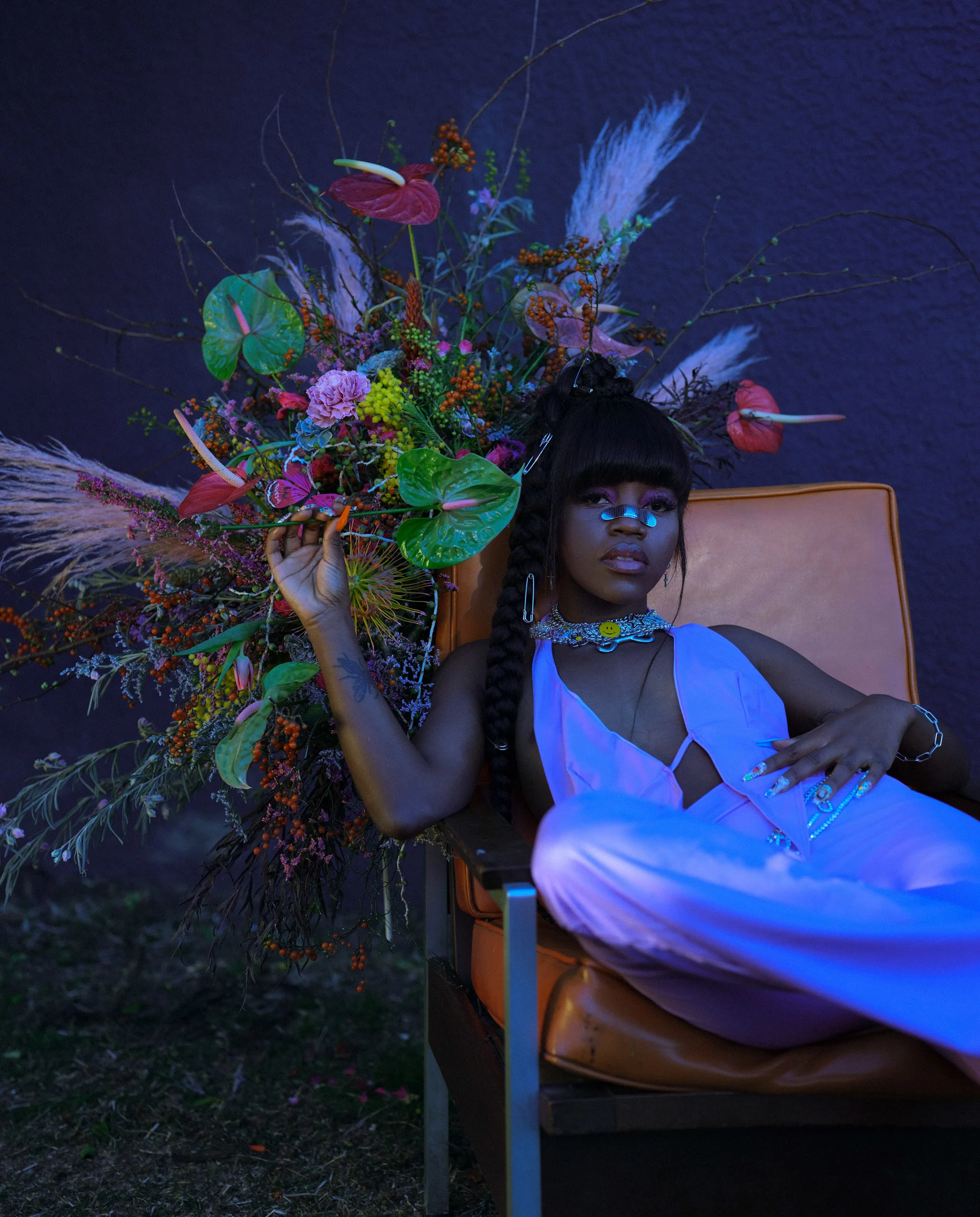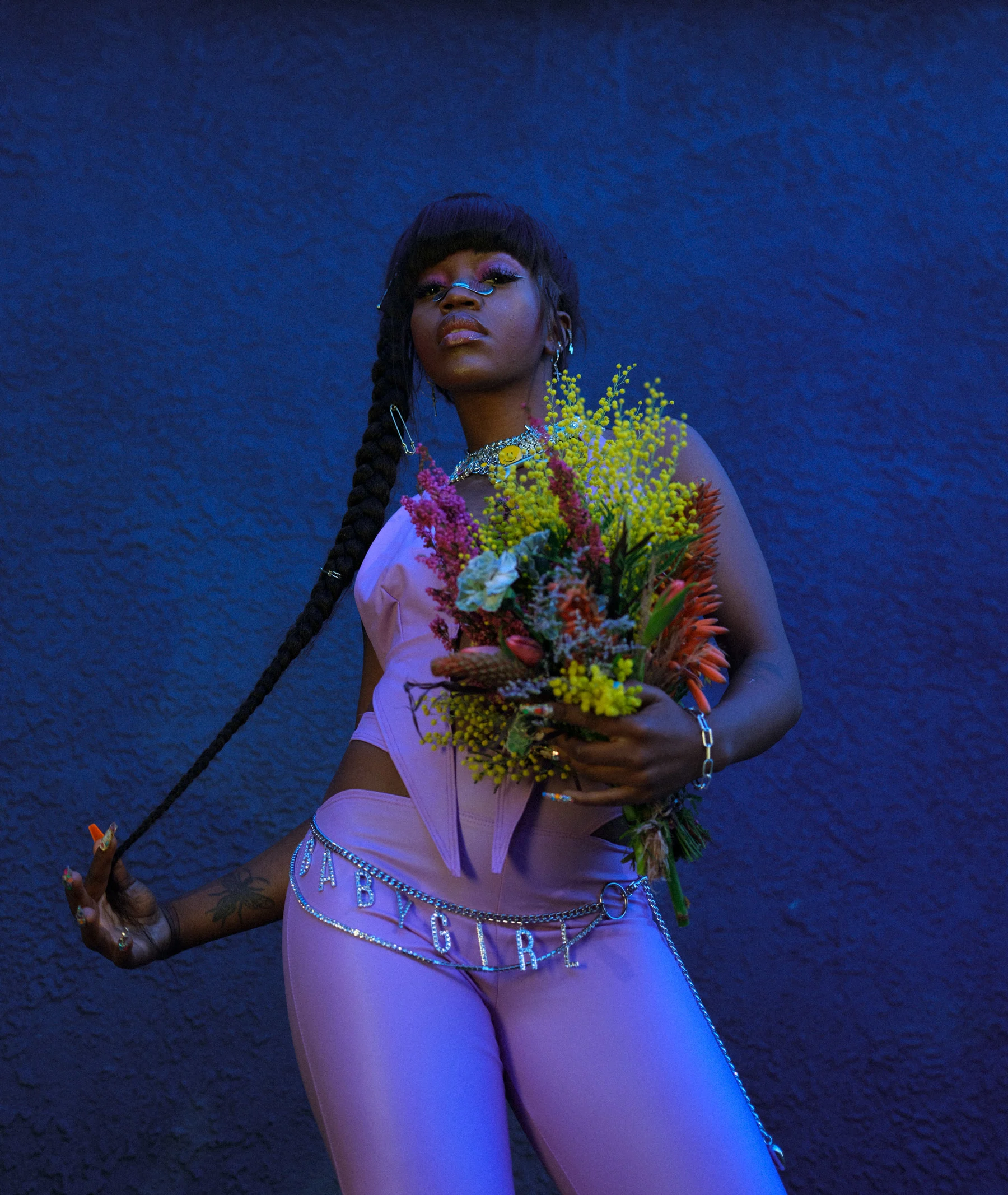

Zimbabwe-born rapper Tkay Maidza has always been ahead of her time. Ambitious, confident, and armed with a vision for a genre-fluid future, she represents a new wave of artists challenging the definition of Australian hip hop. With the final installment of her EP trilogy release – Last Year Was Weird Vol. 3 – approaching, Maidza speaks to Nathania Gilson about finding the right people, embracing DIY during a pandemic, and being unapologetically yourself.
Photos by Kanya Iwana.

Tkay Maidza is leaning into the joy of being lyrically forthright lately. “I think there came a point where I was just like, ‘I literally don’t care what anyone thinks about what I say,’” she shares, speaking on a Zoom call from LA, about finding clarity in her writing process.
Tkay has been wrapping up the final installment of her mixtape trilogy, Last Year Was Weird: an expansive, unpredictable project that tackles self-representation, imagining a future shaped by optimism and balance, and celebrating your outsider status.
Lately, her lyrics feel more spontaneous and driven by her Sagittarius energy: no agenda, no lines to read between. “I’ll have a melody and see what words fit,” Tkay says. “Then somehow it’ll be like, ‘mind your own business.’ Alright, cool. That’s us today! It’s trusting whatever dialogue I have in my mind. But I’m still guided by questions like, what’s the energy? What’s the path? How do I feel lately? That’s how I decide what stays and what doesn’t.”

The 24-year-old Zimbabwean-born Australian rapper, lyricist and creative director first bounced into the Australian music scene with two precocious dance-pop hits: 2013’s Brontosaurus and Handle My Ego (both featuring electronic producer Bad Cop). “In the early stages of my career, I was just trying to find the right people,” she says.
As a teen, she pursued a passion for music at Adelaide's Northern Sound System artist development program. The community workshops introduced her to other kids who were interested in writing and rapping. Tkay also met producers who helped her record and mix her first vocal tracks, and mentors who shaped an early understanding of how to take her first steps in the industry.

She quickly got the attention of industry professionals.“A lot of managers and agents at the time were like, ‘Who's this girl? She's 17! We need to find out who she is and sign her.’” For the next three years, Tkay remembers feeling the need to please people who were interested in her work, while focusing on the craft of writing and building a career path that allowed her to be herself.
2018 – the year Vol. 1 was released – marked a shift in personal growth. Tkay began to surround herself with a forward-thinking team who understood what she was trying to do. They helped her burst out of the Australian music industry bubble. Maidza’s assured track, Flexin’, featuring LA-based rapper Duckwrth, captures this moment in time well: “Minding my business as always / People don't get it, I'm awesome / Talking they want me to fail, I’m too busy to care / Fifth gear in a car seat / With a team behind me.”
There comes a point where you realize you can do whatever you want.

“There comes a point where you realize you can do whatever you want,” Tkay explains. “Especially being a Black artist in Australia. That's such new territory.”
Being based in Los Angeles this year has also been a big motivator for change. “Everyone here is working to go up. If you’re around the right people, it can be really inspiring to be around that energy.”
She questions how connected she feels to the label “Australian hip hop” lately because she thinks it leaves out a lot of artists. “Typically, it’s a very ‘90s, male-driven, kind of pop energy.” How would Tkay define it? “It’s more like African diaspora Australian hip hop, but there’s still not a lot of us, so it’s hard to say what it is. I felt like when I started with Brontosaurus, I was an outlier. I didn’t really fit in.”
I think the most exciting thing is just seeing the feeling of ‘last year was weird’ resonate with so many people.


As a kid, her childhood was soundtracked by the voices of Lauryn Hill, India.Arie and Rihanna. In high school, Tkay’s taste became more introspective. She discovered Kendrick Lamar and Frank Ocean. “I think that’s when I was like, ‘Okay, cool. This is my job. This is my life. And I need to make it last.’”
She has three guiding principles for making new music: firstly, what are the first couple of ideas that come to mind? Secondly, how excited would she be to develop any of those ideas? “The last one is whether I’d be excited to show my cool friends,” says Tkay. “I love pop music and mainstream music, but I always want to hear something that I haven't really heard before. A lot of my friends are like that as well, which is why I trust their opinion so much.”
A big part of bringing Last Year Was Weird to life was finding industry champions who wanted Tkay’s vision to succeed. One of those early supporters was Briana Cheng, Tkay’s A&R rep at the American independent record label, Downtown. “We just became friends. We were of similar age, we liked the same stuff. She would always be like, ‘let’s go to a party! Let’s hang out!’ That’s how we bonded. We had a lot of deep conversations and similar stories about feeling like we didn’t fit in and how we wanted to conduct ourselves in the music industry.”

Briana was one of the first people who noticed Tkay’s evolving talent as she began recording demos for the earliest iterations of Last Year Was Weird. When Briana moved to the UK-based independent label 4AD, she offered encouragement and help to Tkay, who was still figuring out how to shape the project.
“It just made sense to work together because I trusted her as a person, first and foremost,” she says. “When they're your friends, I think it hits different. Because if they – or you – do something wrong, and they do care about you as a person, they’ll let you know. It's about protecting the friendship and building together.”
Another key collaborator on Last Year Was Weird is its producer, Dan Ferber (who was also behind Lizzo and Missy Elliot’s hit, Tempo). “It feels different, working with Dan, because I’m not going to a different session every day. I don’t have to explain myself to someone.” Dan offered a welcoming environment. It was the opposite of speed-dating producers who focused on making music motivated by safe bets and first impressions.
In their first few blind sessions working together, Tkay and Dan weren’t focusing on the lyric writing – it was more about unblocking Tkay’s creativity. “It was just me crying and being like, ‘I don’t know what I’m doing with my life.’ He was just there to listen and be like, ‘Okay, cool. What do you wanna do? Where do you wanna go? We can build on that.’”

Tkay describes Dan as someone who encouraged her to step away from other people’s expectations. “You need friends like that,” she says. “Friends who say, ‘You’re good, but what’s it for? Are you really being yourself?’ It feels healthier to be around someone who’s asking questions like that all the time.”
Beyond music, Tkay is a prolific tweeter. She describes Twitter as a platform where she gets to be among her people. It’s also not uncommon for fans to confess their undying love for her music. “It's pretty surreal,” Tkay says. “When I made 24K, I listened to it so much. I was like: if someone else made this song, I'd be obsessed with it. And that's kind of how it feels to go online and see the music be embraced. I was like, wow, it’s making sense. I feel like I'm who I'm supposed to be and people are seeing that.”

The track, a shimmering R&B anthem about staying true to yourself, features on Last Year Was Weird Vol. 2. Released in 2020, Vol. 2 symbolized Tkay becoming the boss of her own destiny. She was confined to her family home during a government-enforced lockdown in pandemic-ridden Adelaide. This didn’t stop her from creating, though.
Instead, Tkayset-up a green screen in her bedroom and had photoshoots and video shoots using her iPhone. “It was stressful because I was shooting footage to send to the directors, asking, ‘Is this okay? Do the clothes look right?’” But the freedom was fun, too. “It reminded me of being in high school. Taking selfies, filming YouTube videos and not really knowing what you're doing. It was all pretty DIY.”
As she gears up for the release of the last volume in the trilogy, she reflects on how far she’s come. “It’s very bittersweet,” Tkay says. “There's a lot of saying goodbye to things. It feels like it's time to hop into the spaceship and leave. Last Year Was Weird Vol. 1 was like, ‘Alright, I see the spaceship!’, Vol. 2 was about driving the ship forward. Vol 3 is saying goodbye to everything I've learned, accepting things, and just taking off with the ship.”
Back in early 2020, Tkay was on a dream European tour with New York rapper Princess Nokia: a wake-up-crying-from-happiness career highlight. They played roughly six shows together before Covid led to cancellations and venues shutting down.
“She’s unapologetically herself,” Tkay says about what she admires in the genre-defying rapper. “She’s very like, ‘love you guys so much, but I’ll see you in an hour,’ or like, ‘I'm wearing this ‘fit. And I don't care if you like it or not,’ or ‘I look great, but you don't have to tell me cos I already knew that’. It’s all very her. And that’s so cool.”
It feels like it’s time to hop into the spaceship and leave.
When asked what her vision for Last Year Was Weird is beyond music, Tkayis keen to turn the project into an immersive experience – be that a large-scale production or collaborative cultural hub: “I’m still really interested in fashion, and in photography, and film.”
But mostly, she wants anyone unfamiliar with her music and clothing line to feel like they can be part of something bigger: “I think the most exciting thing is just seeing the feeling of ‘last year was weird’ resonate with so many people. Even the word ‘weird’ itself, and how people respond to it: it’s silly, but it’s also inviting and familiar.”
Set Design / Florist: Glorimer Ovalle
Photo Assistant: Chauntice Green
Production: KI Studio

